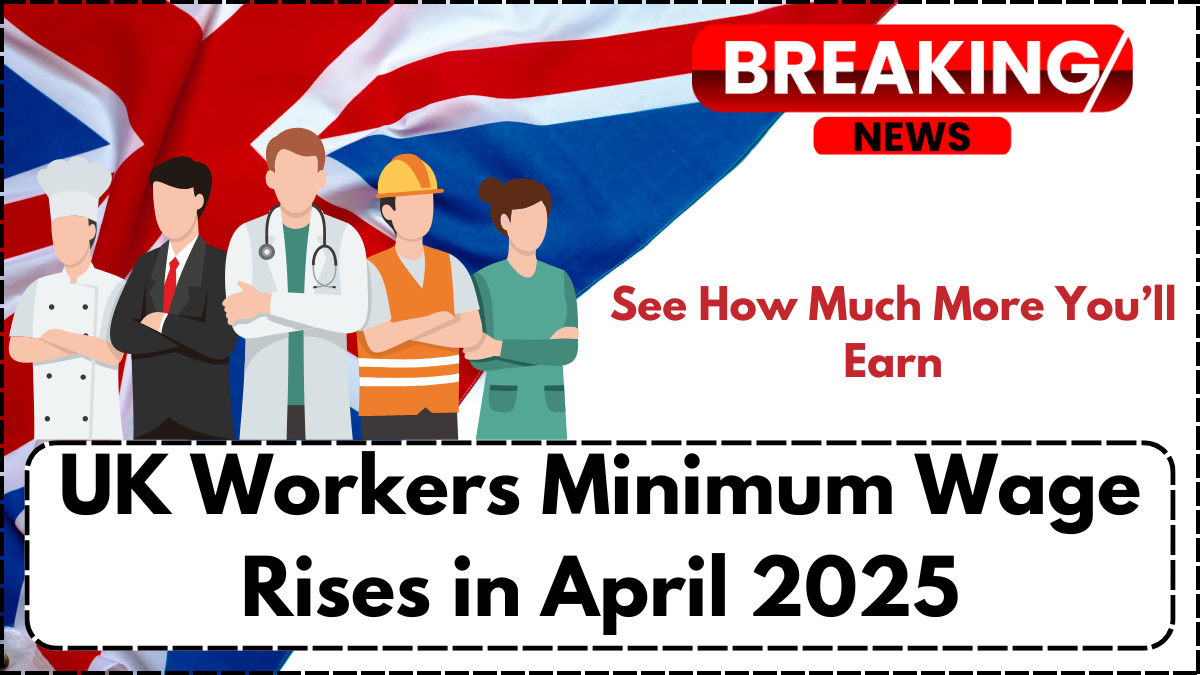The National Minimum Wage (NMW) is the legally mandated minimum hourly pay employers must give eligible workers in the UK. As of April 2025, this wage increase marks one of the most significant boosts in recent years, reflecting economic shifts and the rising cost of living.
This system is designed to ensure that employees, especially those in lower-income brackets, are fairly compensated for their labor. The UK Government, based on recommendations from the Low Pay Commission, reviews and updates these rates every April to keep pace with inflation, living costs, and economic growth.

What Is the National Minimum Wage?
The National Minimum Wage (NMW) is a statutory wage rate that must be paid to workers for each hour worked. It is set by the UK Government and varies depending on a worker’s age and employment status (such as apprentice or full-time employee). While often confused with the National Living Wage (NLW), the latter applies to workers aged 21 and over from 2024 onwards, as per recent legislative changes.
These regulations apply to nearly all types of work, including part-time, full-time, casual labor, and zero-hour contracts. Employers who fail to pay the correct rates face legal penalties and public naming.
When Was the Minimum Wage Introduced?
The National Minimum Wage was first introduced in the UK in 1999 under the National Minimum Wage Act. It was designed to tackle exploitation and support low-paid workers without harming employment levels. Since then, it has become a crucial part of UK labor laws, with annual reviews and adjustments.
2025 Minimum Wage Increase: What’s Changing?
In April 2025, the UK Government has implemented new NMW rates following a significant 10% increase. This move is part of a broader strategy to help workers manage rising living costs due to inflation and broader economic changes.
Below is a breakdown of the updated NMW rates effective April 2025:
National Minimum Wage Rates for 2025
| Age Group / Status | Hourly Rate (2024) | Hourly Rate (2025) | Increase (£) |
|---|---|---|---|
| 16–17 Years | £5.28 | £6.40 | +£1.12 |
| 18–20 Years | £7.49 | £8.60 | +£1.11 |
| 21+ Years (including 23+) | £10.18 – £10.42 | £11.44 | +£1.02 – £1.26 |
| Apprentices | £5.28 | £6.40 | +£1.12 |
Note: From 2024, the National Living Wage applies to all workers aged 21 and over, not just those 23+ as previously.
Who Qualifies for the Minimum Wage?
To receive the National Minimum Wage in the UK, workers must:
-
Be at least of school-leaving age (typically 16).
-
Not fall into exempt categories (such as volunteers, interns without contracts, or family members of the employer living in their home).
-
Have an employment contract (including zero-hour contracts).
-
Be paid through PAYE or receive set wages for their labor.
Apprentices qualify for a different rate if they are under 19 or over 19 but in the first year of their apprenticeship.
Why Is the Minimum Wage Increasing?
The rise in NMW for 2025 is mainly due to:
-
High inflation over the past two years.
-
Government initiatives to reduce in-work poverty.
-
Recommendations from the Low Pay Commission.
-
The push toward closing income inequality gaps across different age groups.
This year’s increase aligns with the broader trend of elevating living standards without causing significant job loss, especially in sectors like hospitality, retail, and care work.
What Does This Mean for Employers?
Employers across the UK are legally required to update their payroll systems to reflect the new rates starting April 2025. Non-compliance can lead to:
-
Penalties up to £20,000 per underpaid worker
-
Public naming by HMRC
-
Back pay liabilities and reputational damage
Businesses are encouraged to review contracts, conduct audits, and consult payroll professionals to stay compliant.
Conclusion
As of April 2025, the UK has introduced one of its largest minimum wage increases in recent history. These changes reflect the Government’s commitment to fair pay, economic stability, and supporting working families amid rising living costs. Whether you’re a worker, apprentice, or employer, staying informed and updated on these changes is essential for legal and financial compliance.
FAQs About the National Minimum Wage 2025
What is the new minimum wage in the UK in 2025?
From April 2025, the new minimum wage for workers aged 21 and above is £11.44 per hour. Younger workers and apprentices also see increases based on their age or role.
Who sets the UK National Minimum Wage?
The UK Government sets the NMW each year based on Low Pay Commission recommendations. These changes usually take effect in April.
Does the National Living Wage apply to workers under 23 now?
Yes, starting in 2024, the National Living Wage applies to workers aged 21 and over, a shift from the previous threshold of 23 and above.
Are employers legally bound to follow NMW rules?
Absolutely. Employers must comply with the latest NMW rates or face legal and financial consequences, including fines and public sanctions.
Can I earn more than the minimum wage?
Yes. Employers can legally pay more than the NMW, and many do depending on experience, skill, role, or company policy.
For More Information Click Here
Pari is a passionate writer known for captivating stories that blend imagination and reality. Inspired by travel, history, and everyday moments, Pari crafts narratives that resonate deeply with readers.




